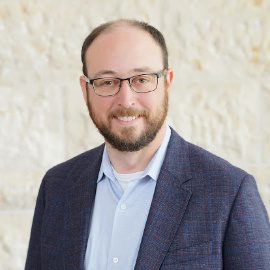WashingtonExec has been reaching out to leaders in government and government contracting who’ve had success to learn more about their habits, experiences and perspectives.

Stephen Gillotte is president and CEO of Reinventing Geospatial Inc., which operates in the command, control, communications and intelligence innovations space as well as provides geospatial expertise in national security. Gillotte got his undergraduate degree in computer science and mathematics from Virginia Polytechnic Institute and State University. He is a member and chair of the Virginia Tech Computer Science Advisory Board, a member of the USGIF Academic Advisory Board, and a fellow with the American Geographical Society.
What’s on your reading list?
My favorite book of late 2018 was “Man’s Search for Meaning” by Viktor Frankl. I actually read it cover to cover in one sitting, which is very much unlike me. It was a fascinating book exploring our freedom to find meaning in what we do. It explores topics often counter to what others believe is humanity’s main driving forces of power and pleasure. It’s really looking at man’s search of meaning in the sense of finding meaning in one’s life. It’s a really good book.
The second thing I’m reading right now is “The Second World: Empires and Influence in the New Global Order” by Parag Khanna. In our defense and intel space, it’s very easy to have our single view of the world and perceive the world through our lens. This book provides a high-level view from everyone else’s perspective of what is driving their country’s decisions. It’s really interesting. The better we know others, the better we know ourselves.
The third book I am about to start reading is called “The Reason I Jump: The Inner Voice of a Thirteen-Year-Old Boy With Autism” by Naoki Higashida. It’s just a fascinating topic from a fascinating author, and I’m actually pretty excited to read that.
Tell me about a time in your life when you had to really stretch yourself in order to learn and grow.
When we transitioned from a very small business to a business that really functions independently of our founders and our key staff, it was a big change in our corporate history. Every founder or CEO describes that transition differently. From our perspective, it was a very hard transition and caused me to need to grow, caused my key leadership to grow. Learning to manage our growth, learning to succeed, making the right business decision instead of the business decision that feels good.
We are still here 10 years later, slugging through the daily grind while supporting our families, which is a direct result of this growth that we’ve done, this mental growth that we’ve done.
If you could go back and give your younger self career and/or life advice, what would you say?
I’m a trained computer scientist and so I saw life back then really through a series of zeros and ones where systems simply outputted the correct answer. What I’ve come to understand is the importance of a robust personal and professional network.
In retrospect, I’ve had the pleasure of working with so many fascinating people in my early days given the communities that I was working in. There were so many missed opportunities that I have had for mentorships from really key individuals for personal growth and really the establishment of lifelong friends. That is the advice I would have given myself 20 years ago.
What’s your favorite city to visit and what do you enjoy doing there?
Most of my colleagues and friends know how much I love to travel, so everyone assumes that this is the easiest softball question for me. In truth, this is literally the hardest question I am asked. I do travel the world. Every place has some type of unique characteristic. I love identifying the uniqueness and enjoying the uniqueness, so it’s very hard for me to pick one location.
What I can tell you from my travels is I love going to Maine and experiencing the great outdoors and the lakes. The architecture of Regent Street near Piccadilly I find fascinating, especially to look at the curvature of the buildings. The wine and the stark landscapes of the Douro Valley. Then I do a lot of hiking in the Mediterranean islands and the Spanish coast, which really is what lets me recharge. There are just so many good places to go in the world that it is hard for me to say there is a favorite city.
Tell me about an app, device or type of technology you personally love and why.
My gut answer is all of the technologies I’m invested in at RGi as we push the envelope on the tactical C5I and the capabilities we provide to the soldier. But if I focus outside of RGi, the area that I find fascinating right now is our growing ability to collect, arguably manage and ultimately understand data on ourselves via our heart rates, our exercise patterns, our habits, our sleep cycles, all of our medical records. It’s very personal data about each one of us which, when put to good use, will lead to a healthier, potentially more productive life.
Some of the apps that I use on Apple are Health, Strava and Garmin Connect. There are so many different data apps about yourself at this point. What I find fascinating about this area is who is going to ultimately own this data, what are they going to do with it, and how do we protect ourselves in this realm as the amount of data sensors on us continues to grow?

